Summary of the previous article
In the previous article (Part 1), I explained the background of our survey, "Survey on Children's Daily Life among 8 Asian Countries 2021.*" This survey targeted mothers with children aged five in these countries, including Japan. I also introduced the definitions of core terms used for the survey, that is, "well-being" (meaning individuals' sound physical and mental health and happiness) and "resilience" (the capacity to adapt and recover from adversity).
Based on the survey results, we reported that children's resilience is associated with their well-being during the pandemic, which is common in all eight Asian countries. These results indicate that it is important to foster children's resilience to attain their well-being under challenging circumstances such as the COVID-19 pandemic.
What are the factors that nurture children's resilience? In this article, I will report our survey results of the analysis based on the data of five-year-olds in Japan.
* Participating countries: Japan, China, The Philippines, Malaysia, Taiwan, Indonesia, Singapore, and Thailand
Factors that nurture children's resilience during the COVID-19 pandemic in Japan
This survey was designed based on the findings of previous studies and the awareness of issues of researchers from eight Asian countries. We determined the survey items by creating a hypothesis where the following factors may foster children's resilience:
- Mothers' parenting attitude and awareness
- Family support for child-rearing (spouse's support, sharing household chores with a spouse, etc.)
- Support from childcare facilities
- Use of digital media in childrearing
- Child's daily activities and play
We sent a questionnaire consisting of these items, with over 150 items in total, to the participant mothers and collected their answers. As a result, it was confirmed that the following factors are associated with children's resilience in Japan: (1)-Mothers' responsive parenting attitude; (2)-Mothers' childrearing confidence; (3)-Support from childcare facilities(caregivers); (4)-Mothers' support when their child is using digital media; (5)-Number of friends to play with (Figure 1).
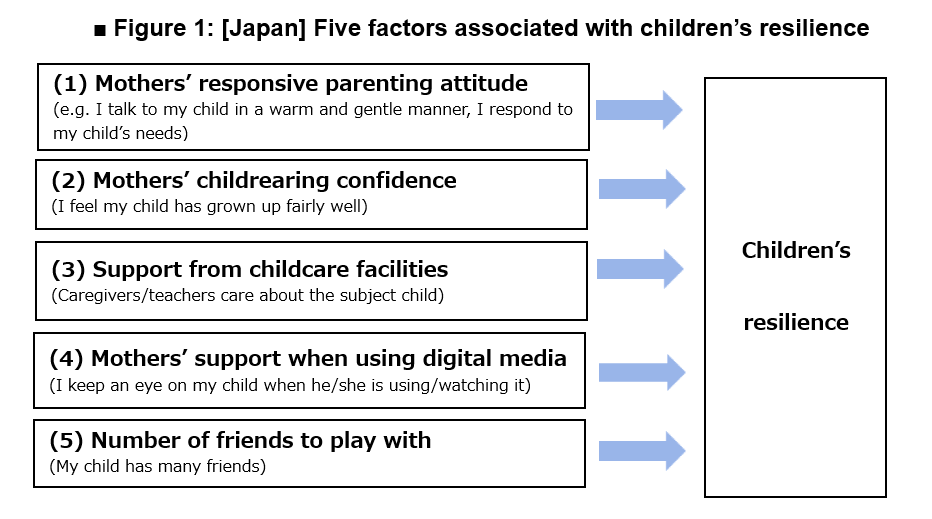
Next, we divided each of the above five items into three groups of "High," "Middle," and "Low" based on the score distribution for analysis. The results indicated that a higher group achieves higher resilience scores (Figures 2 to 6).
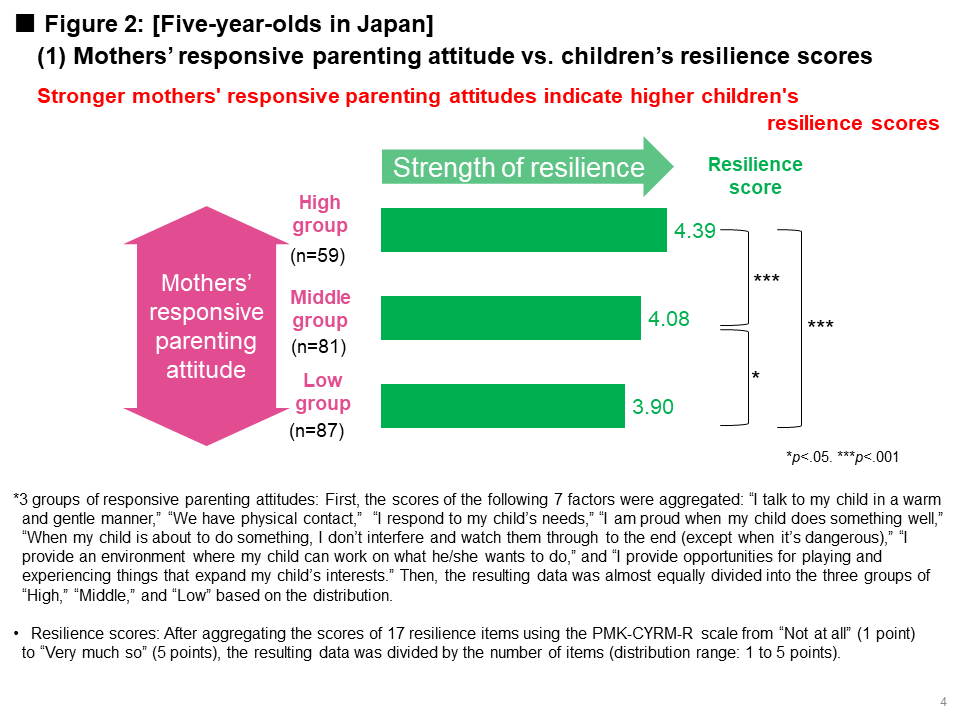
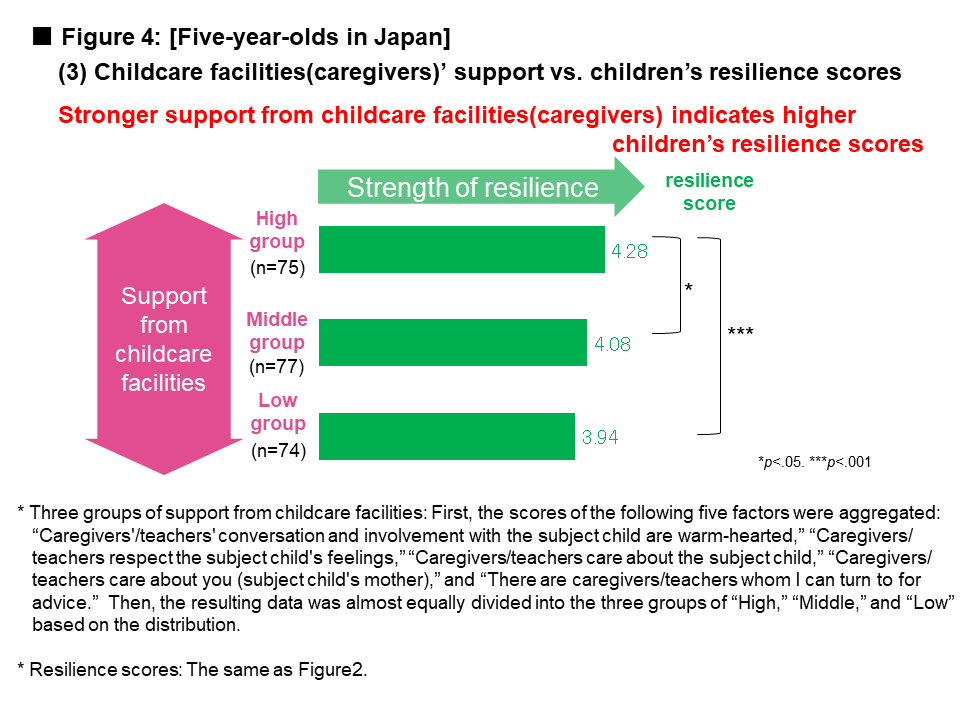
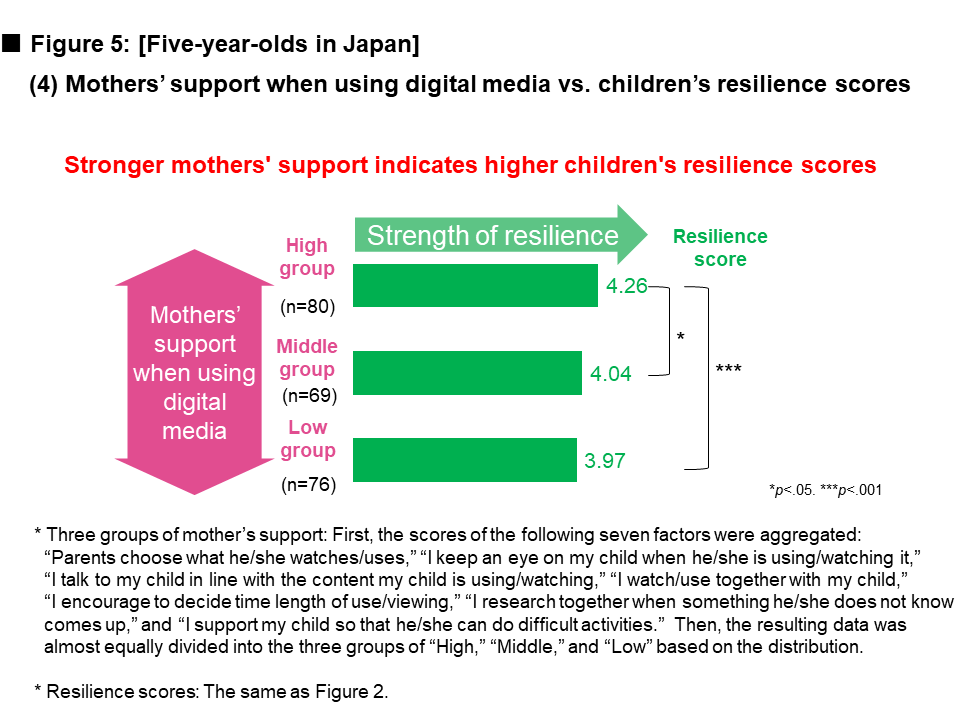
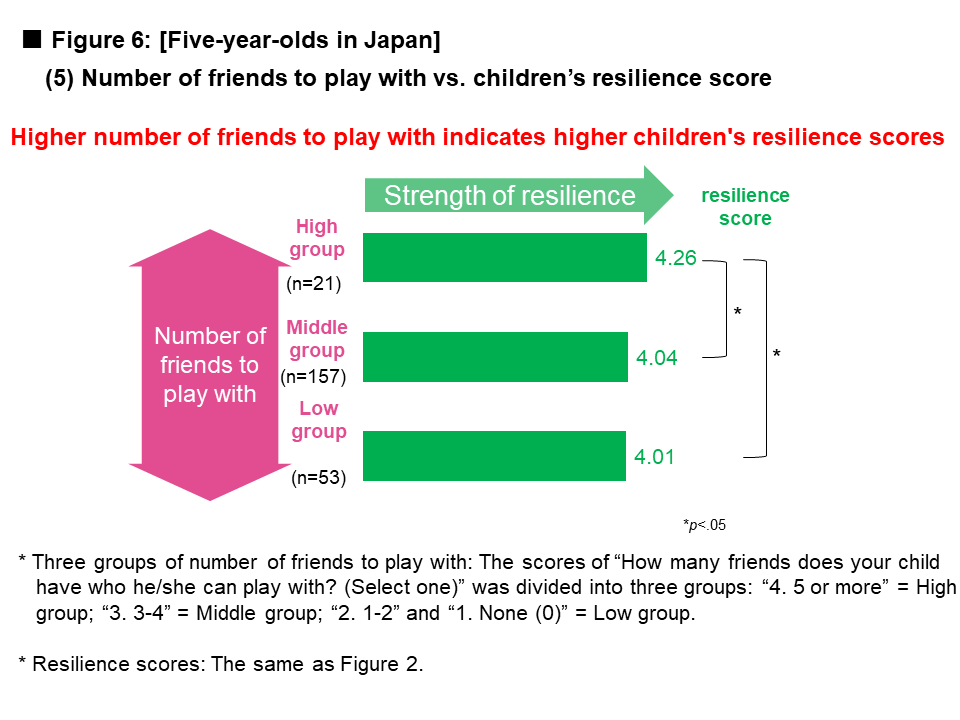
Finally, we conducted a detailed analysis with each component of the synthesis variables of (1) mothers' responsive parenting attitude, (3) childcare facilities(caregivers)' support, and (4) mothers' support when their child is using digital media. As a result, we confirmed that the following components are particularly associated with children's resilience.
― (1)Variables of "mothers' responsive parenting attitude" that are particularly effective in nurturing children's resilience
- I talk to my child in a warm and gentle manner
- We have physical contact
- I respond to my child's needs
- I provide an environment where my child can work on what he/she wants to
― (3)Variables of "childcare facilities(caregivers)' support" that are particularly effective in nurturing children's resilience
- Caregivers/teachers care about the subject child
- There are caregivers/teachers whom I can turn to for advice
― (4)Variables of "mothers' support when using digital media" that are particularly effective in nurturing children's resilience
- I keep an eye on my child when he/she is using/watching it
- I support my child so that he/she can do difficult activities
- I encourage (my child) to decide time length of use/viewing
- Parents choose what he/she watches/uses
N.B. - "I" in the questionnaire items refer to the respondents(mothers).
Summary and Discussion
As a result of this survey, it was confirmed that children's resilience is associated with their well-being during the COVID-19 pandemic. This result is common in all eight Asian countries. Therefore, it can be concluded that fostering children's resilience is essential to attain their well-being under challenging circumstances such as the COVID-19 pandemic.
After we conducted the analysis, we identified the following factors that could promote children's resilience:
- Mothers' responsive parenting attitude
- Mothers' childrearing confidence
- Support from childcare facilities(caregivers)
- Mothers' support when their child is using digital media
- The number of friends to play with
Therefore, support from both families and childcare facilities (caregivers), who are closest to children, are critical factors in fostering children's resilience.
We also looked into the specifics of these factors with data obtained from participants in Japan. As for the aspects of families (parents), the results indicate that in addition to mothers' warm and gentle attitudes towards children and efforts to provide them with a supportive environment, determining certain family rules could enhance children's adaptability and lead to improve their resilience.
We further analyzed the data from Japan regarding childcare facilities(caregivers)' support. As a result, we identified the importance of their support, which is not only keeping an eye on each child but also kindly listening to mothers' worries and concerns. With the help of childcare facilities(caregivers), mothers feel more confident in their childrearing and interactions with their children. This is another factor that could enhance children's resilience.
About three years have elapsed since the outbreak of the COVID-19 pandemic. Support from parents and childcare facilities(caregivers) is essential to ensure children's sound development and growth. I hope that our survey results will provide helpful insights for parents and those involved in early childhood education and care.
References
- Office of Quality of Life Measures https://www.kindl.org/english/information/
- Resilience Research Centre https://cyrm.resilienceresearch.org/















